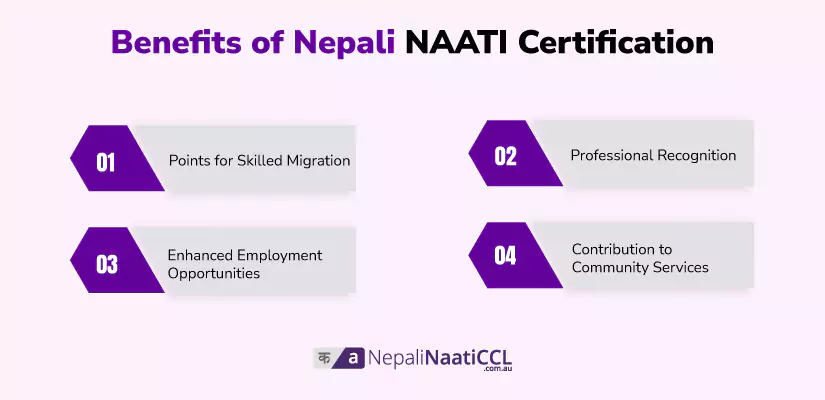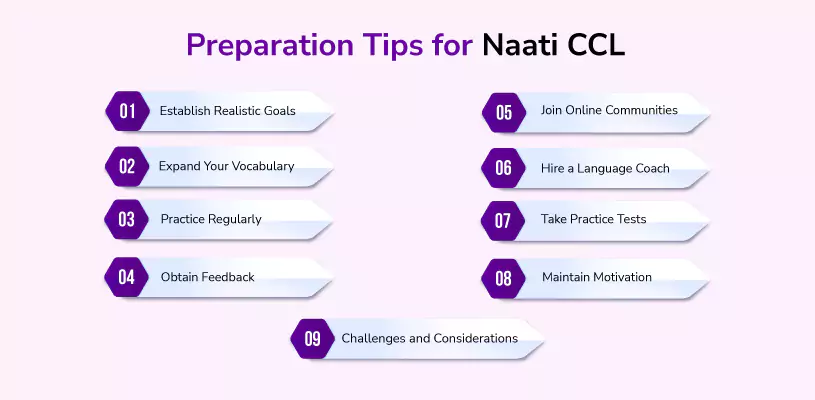Being bilingual is a big advantage in today’s world, especially in multicultural countries like Australia. The National Accreditation Authority for Translators and Interpreters (NAATI) certifies people with the language skills needed to help others communicate across different languages. For Nepali speakers, getting a NAATI certification can open many doors, from better job opportunities to helping out in the community.
This guide covers everything you need to know about How to pass the Nepali NAATI CCL exam, including its benefits, challenges, and how to prepare for it. Whether you’re looking to move to Australia, improve your career, or achieve a personal goal, understanding this certification can help you decide if it’s right.
Introduction
Overview of the NAATI Certification
NAATI (National Accreditation Authority for Translators and Interpreters) is an Australian organization that certifies translators and interpreters. It plays a crucial role in maintaining high standards in the translation and interpretation industry, ensuring that professionals meet rigorous competency criteria. NAATI certification is widely recognized and valued, not only in Australia but also internationally.
Importance of NAATI Certification for Migration and Employment
NAATI certification is particularly important for individuals seeking to migrate to Australia. The Australian government awards additional points for skilled migration to those who hold a NAATI certification, recognizing their ability to communicate in multiple languages effectively. This certification also enhances employability, as it signifies proficiency and professionalism in translation and interpretation, opening up job opportunities in various sectors such as healthcare, legal services, and community support.
What is Nepali NAATI?
Explanation of NAATI
NAATI stands for the National Accreditation Authority for Translators and Interpreters. It is responsible for setting and maintaining high standards for language practitioners in Australia. The organization offers different levels of certification for both translators and interpreters, ensuring they have the skills and knowledge required to perform their duties effectively.
Specifics of the Nepali NAATI Certification
The Nepali NAATI certification is specifically designed for individuals who are proficient in both Nepali and English. It assesses the ability to accurately translate and interpret between these two languages. The certification process involves rigorous testing to evaluate linguistic skills, cultural knowledge, and the ability to handle various translation and interpretation scenarios. This certification is essential for Nepali speakers who wish to work as professional translators or interpreters in Australia.
Benefits of Nepali NAATI Certification

Points for Skilled Migration
One of the significant benefits of obtaining the Nepali NAATI certification is the additional PR points it provides for the skilled migration visa application process. The Australian Department of Home Affairs awards points to applicants who hold a recognized NAATI certification, as it demonstrates their ability to communicate effectively in English and another language, which is highly valued in Australia’s multicultural society.
Professional Recognition
Holding a NAATI certification is a mark of professional recognition. It signifies that the certified individual has met strict standards and is competent in the field of translation and interpretation. This recognition can enhance an individual’s professional credibility, making them more attractive to employers and clients.
Enhanced Employment Opportunities
NAATI certification opens up a wide range of employment opportunities. Certified professionals are in demand in various industries, including healthcare, legal services, education, and community services. They can work as interpreters in hospitals, courts, and schools, or as translators for government agencies, private companies, and non-profit organizations. The certification assures employers of the individual’s proficiency and reliability.
Contribution to Community Services
Certified translators and interpreters play a crucial role in community services by facilitating communication between non-English-speaking individuals and service providers. This is particularly important in multicultural communities, where language barriers can hinder access to essential services. By obtaining the Nepali NAATI certification, individuals can contribute to their community by helping others navigate legal, medical, and social services, thereby promoting inclusivity and understanding.
Also, Check Out: 10 Important Things You Didn’t Know About the NAATI CCL Test. ✅🔔👈
Eligibility Criteria for Nepali NAATI
Language Proficiency Requirements
To be eligible for the Nepali NAATI certification, candidates must demonstrate a high level of proficiency in both Nepali and English. This proficiency is essential because the certification involves interpreting and translating between the two languages. Candidates may be required to provide evidence of their language skills, such as language test scores or previous educational qualifications where the medium of instruction was in English or Nepali.
Professional Background and Experience
While there is no strict requirement for a specific professional background, having experience in fields where translation and interpreting are relevant (such as education, health services, or community services) can be beneficial. This experience can help candidates understand the types of scenarios they will encounter in the exam and improve their performance.
Other Prerequisites
Candidates may also need to meet other prerequisites, such as residency requirements or specific training courses. For instance, some candidates may benefit from taking preparatory courses or workshops offered by NAATI or other accredited institutions to better understand the exam format and expectations.
Read More: Assessment Criteria of the NAATI CCL Exam. ✍️🔔👈
The Nepali NAATI Exam Structure
Components of the Exam
The Nepali NAATI exam typically consists of two main components: interpreting and translating. Each component is designed to assess different skills. The interpreting part tests the candidate’s ability to accurately and fluently interpret spoken dialogues between Nepali and English, while the translating part assesses the candidate’s ability to translate written texts accurately and appropriately.
Types of Questions and Scenarios
The exam includes a variety of question types and scenarios that reflect real-life situations. For the interpreting component, candidates might be asked to interpret conversations between a doctor and a patient, a social worker and a client, or other similar interactions. For the translating component, candidates might need to translate documents such as official forms, letters, or informational brochures.
Exam Duration and Format
The duration of the Nepali NAATI exam can vary but generally lasts a few hours. The exam is often conducted in a formal, controlled environment to ensure the accuracy and fairness of the assessment. Candidates are usually given a set amount of time to complete each section, with breaks in between if necessary.
Preparing for the Nepali NAATI Exam
Study Materials and Resources
Effective preparation for the Nepali NAATI exam involves using a variety of study materials and resources. These can include NAATI’s official preparation materials, language textbooks, online courses, practice guides, and test samples. Candidates should focus on improving both their language skills and their familiarity with interpreting and translating techniques.
Practice Tests and Mock Exams
Taking practice tests and mock exams is a crucial part of preparation. These practice sessions help candidates get used to the format and timing of the actual exam. They also allow candidates to identify areas where they need further improvement. Many institutions offer mock exams that simulate the actual NAATI test environment.
Preparation Tips for Naati CCL

1. Establish Realistic Goals
Begin your preparation by setting realistic goals that match your abilities and availability. Start by evaluating your strengths and weaknesses in Nepali and English, and develop a study plan that targets areas needing improvement. Set attainable weekly goals, such as learning new vocabulary or honing interpreting skills, and monitor your progress to maintain motivation.
2. Expand Your Vocabulary
A robust vocabulary is crucial for the Nepali NAATI CCL exam. Compile a list of profession-related technical terms and study them regularly. Additionally, read newspapers, books, and articles in both Nepali and English to enhance your vocabulary and grasp unique expressions.
3. Practice Regularly
Consistent practice is essential for boosting language proficiency and preparing for the Nepali NAATI CCL exam. Allocate a specific amount of time each day to practice interpreting or translating dialogues and speeches, and utilize online resources to find sample papers and mock tests for practice.
4. Obtain Feedback
Receiving feedback is invaluable for improving your language skills. Ask friends, family, or language coaches to review your interpretations and provide constructive criticism. Pay attention to their suggestions and work on enhancing areas where you may have weaknesses.
5. Join Online Communities
Engaging with online communities of Nepali and English speakers is a great way to practice your language skills, connect with other learners, and understand cultural nuances. Social media platforms like Facebook or LinkedIn have groups where you can participate in discussions, ask questions, and find language partners for practicing interpreting or translating dialogues.
6. Hire a Language Coach
Collaborating with a language coach can help you identify areas for improvement and receive personalized guidance. They can provide feedback, help you prepare for the Nepali NAATI CCL exam, and offer resources and materials tailored to your needs and profession. This can be a valuable investment in your language skills and exam preparation.
7. Take Practice Tests
Taking mock tests is an effective way to get accustomed to the exam format and criteria and identify areas needing improvement. Mock tests replicate the exam experience with timed dialogues and speech recordings that you’ll need to interpret or translate. By taking practice tests, you can build confidence, develop test-taking strategies, and focus your study efforts on specific areas. Additionally, you can use these tests to track your progress over time.
8. Maintain Motivation
Preparing for the Nepali NAATI CCL exam can be demanding and time-consuming, so it’s important to stay motivated throughout the process. Keep your goals in mind, monitor your progress, and celebrate your successes to maintain motivation and stay on track.
💡 Editor’s Choice: How to Pass the NAATI CCL Test on Your First Attempt? 🚀💪
Challenges and Considerations
Difficulty Level of the Exam
Complexity of Language Skills: The Nepali NAATI exam assesses both English and Nepali language skills, requiring proficiency in both languages. The complexity can vary depending on the individual’s background and experience with both languages.
Cultural Nuances: Understanding cultural references and nuances is crucial. Candidates must be familiar with idiomatic expressions, colloquialisms, and culturally specific contexts in both languages.
Technical Vocabulary: Depending on the scenarios presented in the exam, candidates may need to understand and accurately translate technical vocabulary related to various fields such as law, healthcare, or social services.
Common Challenges Faced by Candidates
Time Management: The exam is time-bound, and managing time efficiently while ensuring accuracy can be challenging. Candidates must know the importance of time management in the NAATI CCL exam and practice completing tasks within the given time frame.
Nervousness and Stress: Exam stress can affect performance. Candidates need to develop strategies to manage anxiety and maintain composure during the test.
Balancing Preparation with Other Commitments: Many candidates prepare for the exam while managing work, studies, or family responsibilities. Balancing preparation time with other commitments requires effective time management and dedication.
Time and Financial Investment
Cost of the Exam: The NAATI exam requires a financial investment, including the cost of registration, study materials, and potentially training courses. Candidates should consider their budget and ensure they can afford these expenses.
Time Commitment: Preparing for the NAATI exam demands significant time investment. Candidates should plan their study schedule well in advance to ensure they cover all necessary topics and practice adequately.
Success Stories and Testimonials
Experiences of Successful Candidates
Personal Journeys: Sharing stories of individuals who have successfully passed the Nepali NAATI exam can provide inspiration and insights. These stories often highlight the challenges faced, strategies used, and the ultimate satisfaction of achieving certification.
Preparation Techniques: Successful candidates often share their study techniques, resources used, and how they managed their time. Learning from their experiences can help new candidates devise effective preparation strategies.
Overcoming Obstacles: Many successful candidates face obstacles such as language barriers, lack of resources, or balancing multiple responsibilities. Their stories of overcoming these challenges can be motivating and instructive.
Impact of Certification on Their Careers
Enhanced Job Opportunities: Testimonials often highlight how certification opened up new job opportunities, particularly in sectors requiring bilingual skills such as translation, interpretation, community services, and public service roles.
Career Advancement: Certified individuals may experience career advancement, including promotions or salary increases, as the certification adds value to their professional credentials.
Personal Fulfillment: Achieving NAATI certification can also bring a sense of personal accomplishment and pride, enhancing confidence and professional credibility. Detailed Exam Preparation Strategies
Learn More: Boost Your Career and Life in Australia with NAATI CCL Certification.🚀🔥🔥
Detailed Exam Preparation Strategies
- Language Skills Development: Discuss specific techniques for improving language proficiency, such as immersion, reading extensively in both languages and using language learning apps.
- Cultural Competency: Emphasize the importance of understanding cultural nuances and provide tips on how to become more culturally aware.
- Specialized Vocabulary: Guide on how to build vocabulary specific to common interpreting and translating scenarios, such as medical, legal, and community contexts.
Resources and Study Tools
- Books and Textbooks: Recommend specific books and textbooks for both Nepali and English language improvement, focusing on those geared towards translation and interpretation.
- Online Courses and Webinars: List online courses, webinars, and workshops that can help with NAATI exam preparation.
- Practice Materials: Provide information on where to find practice exams, sample questions, and other relevant study materials.
Tips from Experts
- Interviews with Certified Professionals: Include interviews or quotes from professionals who have successfully obtained NAATI certification, sharing their best practices and advice.
- Advice from Trainers and Educators: Seek input from language educators and trainers who specialize in NAATI exam preparation.
Financial Planning for Certification
- Cost Breakdown: Provide a detailed breakdown of all potential costs associated with NAATI certification, including exam fees, study materials, and preparatory courses.
- Budgeting Tips: Offer practical tips on how to budget for these expenses and suggest ways to manage costs effectively.
✅ Also, Read: Daily Habits for NAATI CCL Test Success. 🔔😊👈
Is Nepali NAATI Certification the Best Path for You?
Assessing Your Career Goals
Professional Aspirations: Consider how the NAATI certification aligns with your long-term career goals. The certification can be highly beneficial if you aim to work in sectors that require or value bilingual proficiency.
Employment Requirements: Research if the certification is required or preferred for your desired job roles. Some positions, especially in government or community services, may mandate NAATI certification.
Weighing the Pros and Cons
Advantages: Reflect on the benefits, such as improved job prospects, the potential for higher income, and professional recognition. The certification can enhance your resume and open doors to new career paths.
Challenges: Consider the challenges discussed earlier, including the difficulty level of the exam, the time and financial investment required, and your readiness to commit to the preparation process.
Making an Informed Decision
Self-Evaluation: Honestly assess your current language proficiency, your ability to commit time and resources to preparation, and your motivation to pursue the certification.
Consultation: Talk to professionals who have undergone the certification, career advisors, or mentors. Their insights can help you make a well-informed decision.
Future Outlook: Consider the long-term benefits and whether the certification will significantly contribute to your career growth and personal development.
By thoroughly evaluating these factors, you can determine whether pursuing the Nepali NAATI certification is the right choice for you.
Conclusion
Pursuing Nepali NAATI certification can be a transformative step for your career and personal development. It not only provides professional recognition and opens up numerous job opportunities but also contributes significantly to community services by bridging communication gaps in multicultural settings. While the certification process demands time, effort, and financial investment, the benefits, such as enhanced employability, 5 Australian PR points with NAATI CCL, and personal fulfillment, can make it a worthwhile endeavor.
Assess your language proficiency, career goals, and readiness to commit to the preparation process. Consider the experiences and testimonials of those who have successfully obtained the certification. By making an informed decision, you can determine if Nepali NAATI certification aligns with your aspirations and whether it is the right choice for your future.
Embark on this journey with confidence, knowing that acquiring Nepali NAATI certification can open doors to a promising and fulfilling career, allowing you to make a meaningful impact in the lives of individuals and communities.
FAQs
1. What is NAATI?
NAATI (National Accreditation Authority for Translators and Interpreters) is an Australian organization responsible for certifying translators and interpreters. It sets and maintains high standards to ensure that language professionals are competent in their roles.
2. Why is NAATI certification important for migration to Australia?
NAATI certification is valuable for migration as the Australian government awards additional points for skilled migration to those who hold a NAATI certification. This demonstrates the ability to effectively communicate in English and another language, which is highly valued in Australia’s multicultural society.
3. What languages does NAATI certify?
NAATI offers certification in many languages, including Nepali. The certification process is designed to assess proficiency in both English and the target language.
4. What are the main components of the Nepali NAATI exam?
The Nepali NAATI exam typically consists of two main components: interpreting and translating. Candidates must demonstrate their ability to accurately interpret spoken dialogues and translate written texts between Nepali and English.
5. How can I prepare for the Nepali NAATI exam?
Preparation involves using a variety of study materials and resources, including NAATI’s official preparation materials, language textbooks, online courses, and practice guides. Taking practice tests and mock exams can help candidates get used to the exam format and timing.
6. What are the eligibility criteria for the Nepali NAATI certification?
Candidates must demonstrate a high level of proficiency in both Nepali and English. While there is no strict requirement for a specific professional background, experience in fields relevant to translation and interpreting can be beneficial. Other prerequisites may include residency requirements or specific training courses.
7. What are some common challenges candidates face when preparing for the NAATI exam?
Common challenges include managing time efficiently during the exam, dealing with nervousness and stress, and balancing preparation with other commitments such as work or studies. Candidates should also be prepared for the financial and time investment required for the exam.









